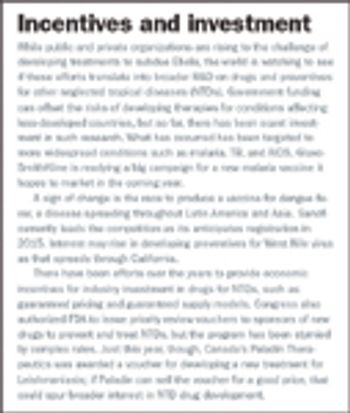
On September 16, 2014, the Ukrainian and European parliaments ratified the EU–Ukraine Association Agreement (AA), providing for harmonization of many spheres of Ukrainian legislation with EU policy.

On September 16, 2014, the Ukrainian and European parliaments ratified the EU–Ukraine Association Agreement (AA), providing for harmonization of many spheres of Ukrainian legislation with EU policy.

The National Institutes of Health (NIH) announced yesterday that it is issuing nearly $32 million in grants for the development of strategies to analyze and leverage biomedical data sets.

After a change in distribution strategy at Genentech, Ascension Health has prohibited sales representatives from the drug maker to solicit physicians at Ascension’s 1900 sites of care around the country.

Thirty-nine years ago this past June, an article appeared in BusinessWeek that offered readers what was for its time a startling degree of foresight.

Researchers at the Massachusetts Institute of Technology (MIT) have devised a novel drug capsule coated with tiny needles to deliver large-molecule biopharmaceuticals.

With more than 8 million Americans now signed up for health insurance through state health exchanges, The Affordable Care Act (ACA) has begun delivering benefits and new insurance protections to a large swath of Americans, many of whom had no health insurance before.

Lurking in the shadows of the US General Elections is something called The Sequestration Transparency Act of 2011.



Companies gain support-and pressure-to deliver new treatments for spreading outbreak.

Pharmaceutical professionals, teams, and organizations can succeed at an elite level by tackling the tough mental challenges of Navy SEAL training.

An escalating political debate over pharma pricing and reimbursement nears the boiling point.

In the wake of last week’s declaration by new HHS Secretary, Sylvia Burwell, that “Obamacare is working”, it’s probably time for American Rx product managers and marketers to step back and consider where we have travelled since January 1st of this year.

In a bit of good news for pharma, Moody’s Investors Service has upgraded its outlook for the global pharmaceutical industry to stable.

Successfully commercializing a proprietary drug in China can be a Kafkaesque affair.

The UK’s Medicines and Healthcare Regulatory Authority (MHRA) has awarded Northwest Biotherapeutics, Inc. (Bethesda, MD) the very first “Promising Innovative Medicine”, or PIM designation, for the company’s DCVax-L product.

This month’s ePatient Connections Summit in Philadelphia, PA, saw biopharmaceutical firms, medical device companies, and patient advocates discuss best practices for engaging patients online and in social media settings.

FDA’s Center for Drug Evaluation and Research is establishing an Emerging Technology Team (ETT) to assist innovative manufacturers in navigating the regulatory process and “overcoming roadblocks”.

The European Federation of Pharmaceutical Industries and Associations (EFPIA) and Canada’s Research-Based Pharmaceutical Companies (Rx&D) have welcome finalization of the text for the Comprehensive Economic and Trade Agreement (CETA).

Hemispherx Biopharma (Philadelphia, PA) has announced a set of research collaborations designed to develop “therapeutic cocktails against Ebola which may potentially overcome the emergence of drug resistance due to Ebola virus mutation”.

Value-based Pricing (VBP) was first discussed as far back as 2007 by the UK’s consumer authority, the now defunct Office of Fair Trading (OFT).

Scary tales of The-Next-Big-Social-Thing killing off the first digital marketing blockbuster have been building for years. McKinsey’s November 2013 iConsumer survey reported a 20 percent decline in email usage between 2008 and 2012, as the medium gave up ground to social networks and mobile messaging apps.

The European Medicines Agency (EMA) is reviewing available information on Ebola treatments currently under development to “facilitate evidence-based decision-making” by health authorities.

The European Federation of Pharmaceutical Industries and Associations (EFPIA) reports that it has “strengthened its commitment in China”.

The Non-Hodgkin Lymphoma (NHL) treatment market in the Asia-Pacific (APAC) countries of India, Australia, China and Japan will expand from $1.1 billion in 2013 to $1.7 billion by 2020, with Japan remaining the largest contributor to growth, according to GBI Research.

Although biopharmaceutical companies and regulatory authorities have made considerable progress in establishing policies for bringing biosimilars to market, key differences and gaps in requirements for testing and documenting product similarity still characterize the European Union, the U.S. and other regions.

What can be gleaned about the direction that health policy will take for the next five years under the new European Commission, scheduled to take office at the beginning of November? Peter O’ Donnell address this question in his new Applied Clinical Trials column here.

Merck KGaA has announced that it has agreed to buy Sigma-Aldrich for $140 per share in cash, or a total of $17 billion.

After almost two years of discussion and analysis, the Food and Drug Administration is finalizing a proposal for collecting data from manufacturers to help measure the performance of manufacturing operations and the quality of resulting drugs and biologics

Although it is true that there are many legitimate ways to succeed, a host of these strategies appear to be diametrically opposite of one another: Diversified versus pure play, generic versus ethical, regional versus global, R&D versus limited R&D, organic development versus acquisitions, and so on.